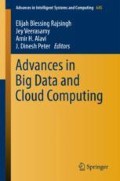Abstract
Feature selection is one of the significant areas of research in the field of data mining, pattern recognition, and machine learning. One of the effective methods of feature selection is to determine the distinctive capability of the individual feature. More the distinctive capability the more interesting the feature is. But in addition to this, another important thing to be considered is the dependency between the different features. Highly dependent features lead to the inaccurate analysis or results. To solve this problem, we present an approach for feature selection based on the correlation analysis (ASCA) between the features. The algorithm works by iteratively removing the features that is highly dependent on each other. Firstly, we define the concept of multi-collinearity and its application to feature selection. Then, we present a new method for selection of attributes based on the correlation analysis. Finally, the proposed approach is tested on the benchmark datasets and the experimental results show that this approach works better than other existing feature selection algorithms both in terms of accuracy and computational overheads.
Access this chapter
Tax calculation will be finalised at checkout
Purchases are for personal use only
References
Pei, H.K.: Data Mining: Concepts and Techniques, 3rd edn. Elsevier (2011)
Hall, M.: Correlation-Based Feature Subset Selection for Machine Learning. University of Waikato, Hamilton, New Zealand (1998)
Fayyad, U., Piatetsky, G., Smyth, P.: From data mining to knowledge discovery in databases. AI Magazine (1996)
Chandrashekhar, G., Sahin, F.: A survey on feature selection methods. Comput. Electr. Eng. 40, 14–28 (2014)
Kononenko, I.: Estimation attributes: analysis and extensions of RELIEF. In: European Conference on Machine Learning, New Brunswick (1994)
Hall, M.: Correlation–based feature selection for discrete and numeric class machine learning. In: 17th International Conference on Machine Learning (2000)
Blum, A.L., Langley, P.: Selection of relevant features and examples in machine learning. Artif. Intell. 97(1), 245–271 (1997)
Cheng, T.-H., Wei, C.P., Tseng, V.: Feature selection for medical data mining. In: IEEE International Symposium on Computer-Based Medical Systems, pp. 165–170 (2006)
Rahman, M.N.A., Lazim, Y.M., Mohamed, F.: Applying rough set theory in multimedia data classification. Int. J. New Comput. Archit Appl 683–693 (2011)
Yang, Y., Pedersen, J.: A comparative study on feature selection in text categorization. In: Proceedings of the 14th International Conference on Machine Learning (1997)
Chouchoulas, A., Shen, Q.: Rough set-aided keyword reduction for text categorisation. Appl. Artif. Intell. 15(9), 843–873 (2001)
Han, J., Hu, X., Lin, T.Y.: Feature subset selection based on relative dependency between attributes. In: 4th International Conference Rough Sets and Current Trends in Computing, Uppsala, Sweden (2004)
Shen, Q., Chouchoulas, A.: A modular approach to generating fuzzy rules with reduced attributes for the monitoring of complex systems. Eng. Appl. Artif. Intell. 263–278 (2002)
Deng, D.: Parallel reduct and its properties. In: Granular Computing, pp. 121–125 (2009)
Liu, H., Setiono, R.: A probabilistic approach to feature selection—a filter solution. In: 13th International Conference on Machine Learning (1996)
Basak, A., Das, A.K.: A graph based feature selection algorithm utilizing attribute intercorrelation. In: IEEE (2016)
Liu, J., et al.: Feature selection based on quality of information. Neurocomputing 225, 11–22 (2017)
Ebrahimpour, M.K., Eftekhari, M.: Ensemble of feature selection methods: a hesitant fuzzy sets approach. Appl. Soft Comput. 300–312 (2017)
Gujrati, D.: Basic Econometrics, 4th edn. McGraw-HILL, USA (1995)
Wikipedia. http://en.m.wikipedia.org/wiki/Rough_set. Accessed July 2016
Mozer, M.C., Jordan, M.I., Petsche, T.: A principled alternative to the self-organising map. In: Advances in Neural Information Processing Systems, Cambridge (1997)
DATA.GOV.UK. https://data.gov.uk/dataset/road-accidents-safety-data. Accessed 01 Nov 2016
Murphy, P., Aha, W.: UCI repository of machine learning databases (1996). http://www.ics.uci.edu/mlearn/MLRepository.html
Author information
Authors and Affiliations
Corresponding author
Editor information
Editors and Affiliations
Rights and permissions
Copyright information
© 2018 Springer Nature Singapore Pte Ltd.
About this paper
Cite this paper
Bedi, J., Toshniwal, D. (2018). Attribute Selection Based on Correlation Analysis. In: Rajsingh, E., Veerasamy, J., Alavi, A., Peter, J. (eds) Advances in Big Data and Cloud Computing. Advances in Intelligent Systems and Computing, vol 645. Springer, Singapore. https://doi.org/10.1007/978-981-10-7200-0_5
Download citation
DOI: https://doi.org/10.1007/978-981-10-7200-0_5
Published:
Publisher Name: Springer, Singapore
Print ISBN: 978-981-10-7199-7
Online ISBN: 978-981-10-7200-0
eBook Packages: EngineeringEngineering (R0)

